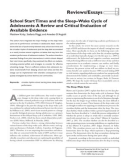by Matthew Kirby, Stefania Maggi, and Amedeo D’Angiulli, Educational Researcher, Vol. 40, No. 2, pp. 56–61 | http://bit.ly/emdbK3
FINDINGS: FROM THE REPORT

This evening preference chronotype is not congruent with early school start times.
-
The asynchrony between school start times and adolescent circadian rhythms can lead to an accumulation of sleep debt is associated with cognitive impairments, and appears to
-
adversely affect behavior,
-
levels of sleepiness,
-
levels of depression,
-
and school-related variables such as attendance and tardiness
-
-
Some schools have delayed school start times, with promising results.
-
Adolescents who attend schools with later start times have been found to sleep more per night, resulting in a more positive temperament, fewer behavioral problems, and an increase in correlates of good academic performance.
-
Instituting a delay in school start times may be accompanied by complications related to transportation costs in some school districts, although this is a much lesser issue for high schools that already require students to use alternative transportation methods (e.g., public transportation, car pools).
-
In addition, changes in start times are associated with disruptions of extracurricular activities and other social and leisure activities in many school districts.
However, with sufficient strategizing and preparation, the inconvenient consequences of changing school start times can be attenuated. There is evidence that with adequate planning and preparation, school boards have been able to delay school start times at acceptable monetary cost (given the enormous potential payoff ) and tolerable disruption of community functioning.
School Start Times and the Sleep-Wake Cycle of Adolescents:

No comments:
Post a Comment